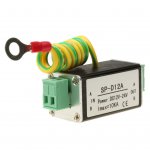Sea-Fever
Active member
Today I took the family out for a run around Portsmouth harbour...more than anything to check everything was OK prior to a longer trip next week.
I always check the wind and tides before i leave port (obviously) and I knew rain was possible with potential for short sunny spells. I admit i didn't pay particular attention to the risk of thunderstorms but found myself smack in the middle of one with lightning to boot. I suddenly felt a bit foolhardy.
I wondered if others pay particular attention to the chance of thunderstorms? Would you stay in port?
The wind was light and the rain, torrential as it was, didn't bother me but I sent the family down below and only half jokingly told the wife she would have to steer if I got fried.
I always check the wind and tides before i leave port (obviously) and I knew rain was possible with potential for short sunny spells. I admit i didn't pay particular attention to the risk of thunderstorms but found myself smack in the middle of one with lightning to boot. I suddenly felt a bit foolhardy.
I wondered if others pay particular attention to the chance of thunderstorms? Would you stay in port?
The wind was light and the rain, torrential as it was, didn't bother me but I sent the family down below and only half jokingly told the wife she would have to steer if I got fried.


